BBC's Blog, page 40
June 8, 2012
Olympic Torch Relay Website
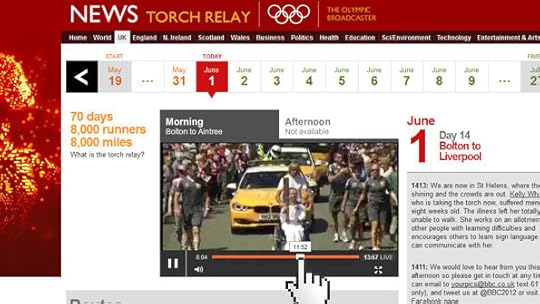
Even if you joined the torch relay live, you can now drag the scrub bar back and see what you missed
In my role as Product Lead in BBC Future Media, I’m responsible for the development of the BBC’s Olympic torch relay website and 2012 Portal.
Couple of news flashes before I start – firstly, UK users can now watch live torch relay video, or #bbctorchcam as it’s known by many, on their iPhones. Secondly, we’ve just enabled "live rewind" functionality on the live video stream for the standard website. So, if you’ve just started watching the morning relay session on the site and missed the Olympic flame go past your house 10 minutes ago, then never fear, just drag the player scrub bar 10 minutes back and hey presto, watch the moment.
Well, the Olympic flame began its 70-day journey across the UK on 19 May and I’ve been delighted to see the generally positive reaction to the site from our online audiences. The site enjoyed 7.8 million page views for the second half of May and, as 2012 online editor Mark Coyle has already mentioned, "BBC torchcam" has become cult viewing.
While national and local TV/radio are dipping into this exciting event as appropriate and live coverage of some sessions has been added to the BBC Red Button schedule, the online site has established itself as a "one-stop shop" for round-the-clock live coverage and torch relay information.
Covering and broadcasting the 8,000-mile whistle-stop tour has been no mean feat, but it doesn’t end there. Although the relay is well under way now, my team is still making enhancements to the site and aiming to make new features available. My main focus is video, both in terms of device availability and new functionality.
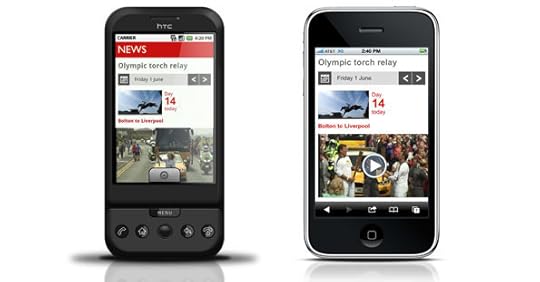
BBC Torchcam is now available on iOS and Android devices
I’ve worked for many years on video propositions for the BBC and am always keen to make sure our content is available on as many platforms as possible.
So I’m pleased to announce we’re finally offering live video coverage of the relay on iOS devices, such as iPhones and iPads, using HLS (HTTP Live Streaming). We already have BBC torchcam available on Android phones and tablets, so this means we should have a much fuller range of coverage on devices from desktop to tablets to mobile.
Also, the torch relay offers us an important opportunity to spearhead the video technology we’re developing for the Olympic Games themselves.
"Live rewind" is a major step forward for us, enabling users to navigate backwards through a live session and find what they want to watch.
The main challenge here has been to make the morning and afternoon video sessions available as HDS (HTTP Dynamic Streaming) video streams and create a customised player to play them on. Thus, the more eagle-eyed among you will have noticed the new video player on the desktop torch relay site, with session tabs at the top and a new play button, to exploit this functionality.
“And”, as comedian Jimmy Cricket likes to say, “there’s more”.
Having enabled live rewind HDS streams, we next aim to implement live-to-VOD (Video-On-Demand) and ‘share the moment’ functionality.
With this functionality, live video sessions would automatically turn into video-on-demand assets and become available for previous days. Providing the pictures were streamed live by BBC torchcam in the first place, you’ll be able to watch them again on demand, going all the way back to day one.
This means you can watch the relay live and, when you see a moment you want to share, you can send that exact moment to your friend, whether it’s live or in the past. Even if your friend doesn’t pick up your email for a couple of days, they’ll be taken to the exact moment you wanted to show them.
I look forward to your questions and comments.
To address one issue - our live online streaming is at the mercy of the 3G signal being used to beam back the images from the media truck. As we’ve seen along the way, the picture sometimes drops out, usually in heavily populated areas where excited onlookers are crowding out the signal with their tweets and Facebook updates.
Basically, we’re recording "as live" so if your "moment" was during one of these "blackouts", then unfortunately for now, they’ll remain blacked out, even as on-demand video. Not ideal I know, but we’re working on it, and hopefully there’s still enough of the 70-day/14-hour-a-day coverage for you to enjoy.
Mike Burnett is Olympic Torch Relay Product Lead, BBC Future Media
June 1, 2012
What's on BBC Red Button 2nd June - 9th June

The Diamond Jubilee
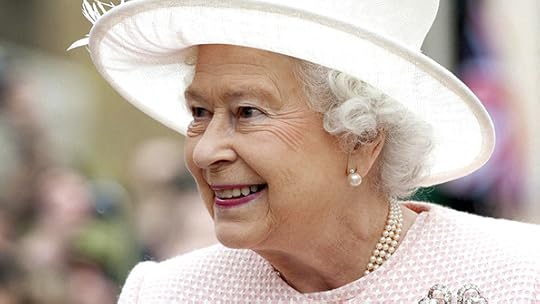
Follow the Diamond Jubilee Celebrations on the Red Button. There will be uninterrupted coverage from the events (not available on Freeview) during the BBC One programmes, you will be able to watch the events in full without commentary. Over the weekend we will be showing either full repeats of the events or highlights.
Available on all platforms
Freesat/Sky:
Sun 3rd June, 1:30pm-10:30pm
Mon 4th June, 12:20am-6:00am until Tue 5th June 4:00pm
Tue 5th June, 5:25pm until Thu 7th June 4:00am
Virgin Media:
Sun 3rd June, 1:30pm-10:30pm
Mon 4th June, 12:20am until Tue 5th June 4:00pm
Tue 5th June, 5:25pm until Wed 6th June 9:25pm
Thu 7th June, 4:30am-8:55pm
Freeview:
Sun 3rd June, 5:55pm-10:30pm
Mon 4th June, 12:20am-1:50pm, 7:10pm-8:45pm, 10:40pm until Tue 5th June 9:15am
Tue 5th June, 5:25pm-7:15pm
Wed 6th June, 12:00am-7:50pm
London Collection
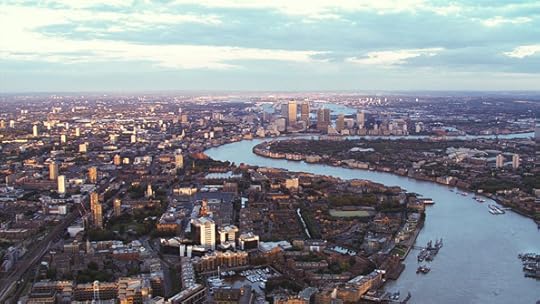
Aerial view of London, looking east towards Canary Wharf
The London Collection is an archive collection that celebrates the people and places of London. Highlights are available on the red button and the full archive collection is available online at BBC Four Collections. There will be various programmes on both BBC Two and BBC Four which are supported by this collection.
Available on all platforms
Freesat/Sky/Virgin Media:
Wed 6th June, 9:55pm-4:00am
Thu 7th June, 7:00pm-10:35pm, 11:35pm-4:00am
Freeview:
Wed 6th June, 9:55pm-4:00am
Thu 7th June, 10:10pm-4:00am
Springwatch
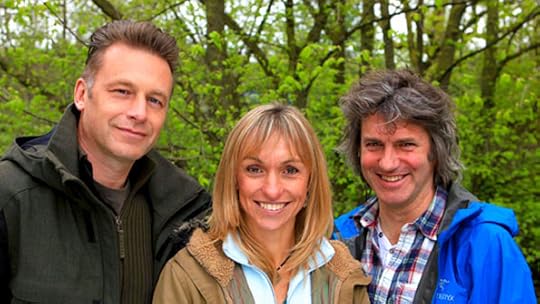
(LR) Chris Packham, Michaela Strachan, Martin Hughes-Games
You can watch the Springwatch webcams for the first time on Red Button this year, as we follow the early lives of the UK's best-loved animals. Also, your stunning photos of spring, direct from the Springwatch Flickr group will be available when the webcams have finished. For more Springwatch content including more webcams and all the photos go to
bbc.co.uk/springwatch
Available on all platforms
Freesat/Sky:
Sat 2nd June, 6:00am until Fri 8th June 3:45pm
Fri 8th June, 7:30pm until Sat 9th June 7:00pm
Sat 9th June, 10:30pm-6:00am
Freeview:
Sat 2nd June, 6:00am-6:50am, 11:25pm-4:00am
Mon 4th June, 8:55pm-10:30pm
Tue 5th June, 7:25pm-11:50pm
Wed 6th June, 8:00pm-9:45pm
Thu 7th June, 4:10am-6:50am, 7:10pm-10:00pm
Virgin Media:
Sat 2nd June, 6:00am until Mon 4th June 06:30am
Mon 4th June, 10:30pm until Tue 5th June 6:30am
Tue 5th June, 10:30am-2:30pm, 6:30pm until Wed 6th June 6:30am
Wed 6th June, 10:30am-2:30pm, 6:30pm until Thu 7th June 6:30am
Thu 7th June, 10:30am-2:30pm, 9:25pm until Fri 8th June 3:45pm
Fri 8th June, 7:30pm until Sat 9th June 7:00pm
Sat 9th June, 10:30pm-6:00am
CBBC Extra
Press red on the CBBC channel this week and join Chris and Cel as they introduce exclusive clips from a wealth of CBBC goodies including all new 12 Again, Deadly 60 and Horrible Histories.
You can also read Chris and Dodge's blog, answers to some of your questions, read your horoscopes and see if the jokes that made Chris and Dodge LOL will have the same effect on you.
Go on, press red... You know you want to!
Available on all platforms
Freesat/Sky/Virgin Media:
Sat 2nd June, 7:00am-10:00am
Mon 4th June, 7:00am-10:00am, 3:00pm-6:00pm
Tue 5th June, 7:00am-10:00am, 3:00pm-6:00pm
Wed 6th June, 7:00am-10:00am, 3:00pm-6:00pm
Thu 7th June, 7:00am-10:00am, 3:00pm-6:00pm
Fri 8th June, 7:00am-10:00am, 3:00pm-6:00pm
Freeview:
Sat 2nd June, 7:00am-10:00am
Tue 5th June, 3:45pm-5:15pm
Thu 7th June, 7:00am-10:00am
Fri 8th June, 7:00am-10:00am
News Multiscreen: Video Choice
Everyday the BBC News On Demand team rounds up the day's news to bring viewers a two-minute bulletin of headlines. On weekends the tone becomes more conversational when Red Button viewers can watch a topical interview in 'Five Minutes with...' or a round-up of the week's weird and wonderful videos in Odd Box.
Five Minutes With... / Odd Box: Weekends (around the clock)
Available on Sky and Virgin only
CBeebies Red Button
BBC Red Button welcomes younger viewers and grown-ups with a sense of adventure to the big, bright and fun world of CBeebies interactive!
Your children's favourite characters are at the heart of the interactive TV experience. Satellite and digital terrestrial viewers will have slightly different offerings from one another. This has enabled the Red Button team to offer the best games tailored to each system.
CBeebies Red Button is available on the CBeebies channel, and via page 5900 on other channels.
Available on Freeview and Sky only
BBC Sport Multiscreen**
Catch up on all the latest Sport via the BBC Sport multiscreen. Headlines are available around the clock with up to five additional streams available to cover the
best that BBC Sport has to offer.
Please note that Red Button sport timings are subject to change at short notice.
For the latest information refer to the BBC Sport website.
Highlights
Cricket - Test Match Special and Scorecard of the third Test Match between England and the West Indies.
MotoGP - Live coverage of the Moto2 & Moto3 races from Catalunya, Spain.
Olympics - Torch Relay: Live coverage of the Olympic Torch relay from Londonderry.
**Note all Red Button times are subject to change at short notice
5 Interesting Stories: Olympic Plans, Prototypes, Privacy, and iPlayer stats

Preparing the Palace of Arts for broadcasting the 1948 London Olympics
It's been a fortnight of long-laid plans. It's been the first fortnight of the torch relay, kicking off the BBC's digital coverage of the Olympics; the Connected Studio have had their first "build studio", and we've caught up with four months of iPlayer stats.
1. Olympics Plans
On Sunday May 20, Owen Gibson of the Guardian interviewed the BBC's Director of 2012 Roger Mosey about his ambitious plans for the Olympics. Owen wondered how the audience will find their way through so much content.
The Olympics will all but take over BBC1 and an extended-hours BBC3 for 17 days this summer, and 24 new dedicated channels besides on cable and satellite. Mosey promises "every event from the first thing in the morning to the last thing at night", offering 2,500 hours of sports coverage alone – 1,000 more than from Beijing.
The huge choice, including a new digital dashboard that will allow viewers to build their own schedule of live and recorded events, could lead to paralysis or diminish the ability to tell the "story" of the Games. Mosey concedes navigation is "a major challenge" but thinks his team have got the balance right.
Staff have blogged here about those 24 live streams (and how capacity is being increased), the Sports product on web (update) and on Connected TV, and given an inside look at the semantic logic that underpins both.
Bloggers and online magazines shared a preview of what the BBC's digital plans will look like on different devices.
Pocket Lint’s Hunter Skipworth gave readers a hands-on review of the BBC's Olympic apps and sites on a range of mobiles and connected TVs:
At the moment the application is going to be running on Sony smart TVs, Virgin Media TiVo via the red button and the PlayStation 3 via an app. No Xbox sadly.
PaidContent's Robert Andrews interviewed Phil Fearnly:
But the BBC News & Knowledge general manager is promising a buzzword right on-message with London games organisers themselves – “legacy”.
Robert expanded on this in his main article:
Much of the BBC’s digital Olympics offering is merely the result of the continuous iterative product development that the corporation undergoes. The platforms that have been built are also expected to be redeployed for upcoming live events including Euro 2012 and Wimbledon.
2. The Connected Studio's first "build studio"
On May 21st and 22nd, the successful participants from the first Connected Studio day came to Salford for two days to work on the next stage of their homepage and search proposals.
The team tweeted from the build studio:
Muffled voices and furious fingers scurrying across keyboards as the final preparations are made for the pitches in 10 min #bbcconnected
— BBC Connected Studio (@BBC_Connected) May 22, 2012
The Connected Studio aims to fund innovative projects and prototypes that might become part of BBC Online's ten products.
If you are interested in the next connected studio, for Weather and Travel News on June 12th, have a look at Adrian Woolard's latest blog post, which has more information including how to register your interest.
Simon Hopkins of Unthinkable Consulting compared the first one-day studio, on May 4th, to a hackday:
I should emphasise that while the day took something from the hack day idea, it wasn't strictly one. Rather it was a "concept hack day", if you like; the hope was that by the end of the day teams would have ideas which, if approved (more of this in a moment) might move on to the early development phase.
I particularly liked the fact that ideas in any state of preparation were welcomed, from the vaguest notion through to fully fledged paper prototypes.

Chocolate chip cookies. Pic by Kari Sullivan, used under licence
3. Cookies and Privacy
Last Saturday (May 26th), the UK implemented the new EU cookie law.
Ian Hunter, Managing Editor BBC Online, blogged ahead of time about changes to how Cookies were handled on bbc.co.uk:
From today users of BBC Online will be presented with a banner telling them about the use of cookies and how they can change their settings at any time, on first use of their chosen browser (e.g. Internet Explorer, FireFox etc).
Several commentators compared how different sites had tried to say within the law, including the BBC.
Graham Charlton of e-Consultancy called it a "good solution":
Crucially, it doesn't impact the user experience. Even after turning all cookies off, the site still functioned reasonably well.
The BBC possibly feels it has to set an example here, and it has gone further than other sites have so far. Still, it has managed to do so while not interrupting the user experience
Claudiu Morariu of PadiCode subtitled his summary "BBC is my favourite":
What I love about BBC is that they went a step further. For those users who do care about their privacy they have created a dedicated privacy page, in plain language, where they can learn details about all the cookies and they can control which ones are setup and which not.
But Christie McMonagle of Attacat noticed a cookie to which she didn't think she'd explicitly consented:
BUT during an Attacat test before getting consent the BBC website had already set the S1 “analytic” cookie on the main page – so maybe not as clean as they seem (but in lines with revised guidance)
Commenters on Ian's blog post queried whether the BBC had implemented the rules correctly; one criticised the classification of log analytics cookies as "strictly necessary":
Now, I see completely why you'd find that useful information to have, but it's flat out untrue to say that your ability to get good log analysis is strictly necessary to a user's browsing of the site.
Ian Hunter responded to comments:
Our approach seems to us, and of course we have taken legal advice, to meet the terms of the new regulations in a sensible way.
First, we believe that our approach would have been compliant even before the ICO issued their revised guidance on 25 May ...
Second, to Ewan's comment, we have designated these cookies as "strictly necessary" because they are sometimes used in conjunction with other cookies to provide a service that has been explicitly requested by users. However, their use for log analysis would not be enough to make them "strictly necessary" and we'll amend the wording here to make that clear.
4. Four Months of BBC iPlayer Performance
On Tuesday, the Media Centre released the iPlayer statistics for the first four months of 2012.
They showed growth in alternatives to desktop - from connected TVs to mobiles, as Matt Brian of The Next Web noted:
During that time, smartphone and tablet devices accounted for 15% of total programme views, with Internet-connected devices — including your Smart TV, games console and Blu-ray player — contributed a further 11%.
The figures are impressive when you factor in that mobile device use almost doubled (94%) in one year and Internet-connected devices saw 57% growth from April 2011.
Alex Francis of Plugged In was excited by the news:
Traditional TV viewing is actually at a ten-year high, according to Ofcom, but that doesn’t seem to have stopped us from catching up on missed programmes, or simply enjoying them a second time around. Long live BBC iPlayer!
Even more excited were the Daily Mail and the Sun, who noticed that the most popular show on BBC iPlayer was the episode of Sherlock in which actress Lara Pulver was naked (bar shoes), giving them an excuse to illustrate a story about iPlayer stats with pictures of a naked woman.
"Lara Pul-s in Viewers" declaimed the Sun. The Daily Mail, despite including two stills, thought viewers might be re-watching the show for the plot (spoiler):
It is thought thousands watched the series back to try to uncover clues as to how Holmes was able to fake his own death.
5. Echoes of the Radiophonic Workshop
On Wednesday, Olivier Thereaux of BBC Research and Development blogged about his team's work on audio metadata and researching the Radiophonic Workshop. As well as recovering plans for the devices they used to create their unique sounds, they tried to track down a Radiophonic Workshop journal mentioned on Wikipedia:
We looked everywhere we could for the mythical journals, even enlisting the help of our R&D librarian Louise Martin, to no avail. Louise helped us find plenty of material such as articles and books on the workshop, but the journals were nowhere to be found. It eventually took a conversation with radiophonic workshop veteran Dick Mills to dispel our dreams of poring through a pile of workshop journals: the workshop team did not publish its own journals, but had, through the years, contributed a number of articles to magazines such as Practical Electronics, Studio Sound and the Dr. Who Magazine
Remember that Wikipedia doesn't expect you to trust them, and enjoy the Jubilee weekend.
Ian McDonald is Content Producer, BBC Internet Blog
May 31, 2012
A Glimpse into the Future: South Korea
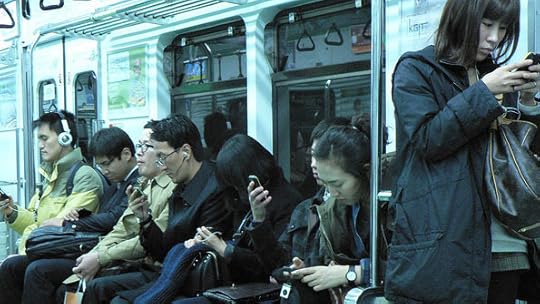
Travellers on the Seoul Metro looking at their phones. Pic by Marc Smith, used under licence
Imagine if the UK's average connection speed was quadrupled to 17.5Mbps; superfast broadband penetration was cranked up nearly two-and-half-times to 83%; and the DAB network upgraded to send live TV to our mobiles. How far in the future would you have to go to see what that might be like?
Sadly the TARDIS outside Television Centre is in for a service. But if you do want to find out, take a look at South Korea. I was in Seoul earlier this month at the Korean Communications Conference to find out more about how Korea's impressive communications infrastructure is challenging some of our assumptions about broadcasting.
One of those assumptions is that people instinctively prefer to watch TV on a big screen whilst relaxing on their sofas. That might look like the case in the UK, where consumption of the BBC's TV services via smartphone is only about 0.04% of total consumption, and 0.05% by tablet. However it's not obvious in Korea, where mobile TV is now very popular indeed, driven by faster mobile broadband and Digital Multimedia Broadcasting (DMB, essentially an upgraded DAB).
DMB allows high-quality TV reception on-the-move. Introduced by Korea in 2004, it's now very widely used on mobile phones, personal media players, tablet computers and is routinely fitted in cars. And whilst the auction for 4G spectrum is yet to take place in the UK, 4G LTE started in Korea midway through 2011.
These developments have meant that bigger mobile phone screens - between a tablet and a smartphone - have become extremely popular, squeezing the market for devices such as the iPad.
A second assumption challenged by South Korea's experience is that consumers by instinct prefer linear broadcasting to on-demand. In the UK, catch-up viewing of the BBC's TV services makes up about 1% of total viewing. On some measures, in Korea around half of total viewing is now via catch-up.
As the home of the world's best and fastest communications infrastructure, Korea also lays claim to some of the most innovative companies shaping consumer technology's future. They are leading the way in how we may interact with our TVs, already producing models that provide voice and motion control as well as face recognition. Significantly more advanced systems are in development however, including 'brain wave TV' which, via headgear, can identify broad categories of viewers' thoughts.
A potentially nearer-term consumer technology is holographic TV. At the moment, holographic technology is occasionally used for exhibition or advertising displays and can use a lot of data to transmit, but many pundits - such as the Korean Communication Commission's Dr Sang-il Park, a former CTO of Samsung - believe it will be far more significant and popular than current 'basic' 3D. It's certainly clear from Korean manufacturers that there is a lot more 'smartness' to come in TV manufacture, including artificial intelligence.
My sense after visiting South Korea is that in the UK we shouldn't be complacent about the continued success of the traditional broadcasting model.
The UK sector may evolve very rapidly indeed as the speed, availability and convenience of digital and IP functionalities reaches a tipping point into the fully mainstream.
John Tate is Director, BBC Policy & Strategy and Chairman, BBC Studios & Post-Production
Mobile Homepage Goes Live
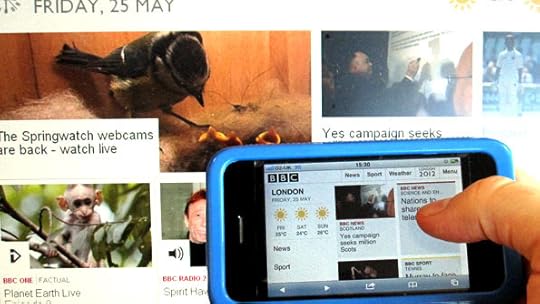
The new mobile homepage reflects the design of the homepage on desktops
I’m proud to announce the mobile homepage has come out of its Beta mode into a full launch and is now available at m.bbc.co.uk.
The old mobile homepage wasn’t meeting our users increased needs and expectations. We wanted to improve this experience and bring it more in line with the desktop version which launched at the end of last year.
Feedback from Beta
During the beta period we were able to track usage and could see how people were using the product. Hundreds of thousands of people have visited the page and were able to see that of our beta test users, a third used the location setting and one in nine customised their content.
Thanks so much for the feedback, which was mostly positive.
We had lots of comments via emails, blog posts and across social media; all of these were collated and reviewed and where possible new functionality has been developed to help us improve the product.
There was an immediate need for further customisation options. We received 20 direct emails, as well as blog post comments like that of Egg of Maidstone:
I want several items of local news, UK news, world news, technology news, entertainment news, sport news, football news and, most importantly, My Club news. Instead I'm stuck with a couple of "news" items, a couple of "local news" items and some random sports news.
The most popular requests were Technology and F1, which we have added.
We also plan to launch additional options such as Radio 1 and Things To Do in the coming months.
We also decided that all links to elsewhere in the BBC should go to other mobile sites, as FoolOnTheHill suggested:
However, they currently link to the non-mobile version of the pages - I assume this is not as intended...
So, what else is new?
As well as new customisation options and changing the links, other new features which have been added to the BBC Mobile Homepage based on audience feedback include:
Location auto detect – Automatically detecting your location to bring you local news and weather.
Breaking news and sport - Introducing these modes allows us to ensure we are delivering the top stories quickly to our audience
Four column layout – this will offer a better experience for users on new wider screen phones
Tell us what you think
As always I’d like to know your thoughts so please post a constructive comment under this blog, or tell us what you think on Twitter using the #bbchomepage hashtag.
Eleni Sharp is the Product Manager of the BBC Mobile Homepage
May 25, 2012
What's on BBC Red Button 26th May - 2nd June


Springwatch
You can watch the Springwatch webcams for the first time on Red Button this year, as we follow the early lives of the UK's best-loved animals. Also, your stunning photos of spring, direct from the Springwatch Flickr group will be available when the webcams have finished. For more Springwatch content including more webcams and all the photos go to bbc.co.uk/springwatch
Available on all platforms
Freesat/Sky/Virgin Media:
Sun 27th May, 6:15pm-6:00am
Mon 28th May-Sat 2nd June, 6:00am-6:00am
Freeview:
Sun 27th May, 7:10pm-12:00am
Mon 28th May-Wed 30th May, 4:00am-12:00am
Thu 31st May-Fri 1st June 4:00am-12:00pm
Fri 1st June, 1:00pm-2:50pm, 6:10pm-6:00am
Sat 2nd June, 6:00am-6:50am, 11:25pm-4:00am
Chelsea Flower Show

Toby Buckland hosts the Red Button offering with tours of this year's larger show gardens, including detailed commentary from the designers on the inspiration behind their designs.
In addition, plant-a-holics Tom Hart Dyke and Christine Walkden will be sharing tales from the vast treasure trove that is the Great Pavilion, speaking to the passionate exhibitors who have been working for weeks, months and sometimes years in preparation for the week-long floral extravaganza.
Available on all platforms
Freesat/Sky/Virgin Media:
Sat 26th May, 6:00am-11:40am, 6:30pm-6:00am
Sun 27th May, 06:00am-11:35am, 5:15pm-4:00am
Freeview:
Sat 26th May, 6:00am-9:45am
Sun 27th May, 5:45am-7:00pm

Press the Red Button for an interactive Eurovision experience allowing users to sing along to the lyrics of all the songs, in both English and the original languages.
Viewers will also be invited to share their messages and photos via the BBC website, Facebook, Twitter and SMS and these comments will be broadcast throughout the show.
Available on all platforms
Freesat/Sky/Virgin Media:
Sat 26th May, 8:00pm-12:00am
Freeview:
Sat 26th May, 8:00pm-11:15pm
CBBC Extra
Press red on the CBBC channel this week and join Chris and Hacker. T. Dog as they introduce exclusive clips from a wealth of CBBC goodies including all-new Horrible Histories and Blue Peter.
You can also read Chris and Dodge's blog, answers to some of your questions, read your horoscopes and see if the jokes that made Chris and Dodge LOL will have the same effect on you.
Go on, press red... You know you want to!
Available on all platforms
Freesat/Sky/Virgin Media:
Sat 26th May, 7:00am-10:00am
Mon 28th May - Fri 1st June, 7:00am-10:00am, 3:00pm-6:00pm
Sat 2nd June, 7:00am-10:00am
Freeview:
Fri 1st June, 3:00pm-6:00pm
Sat 2nd June,7:00am-10:00am
News Multiscreen: Video Choice
Everyday the BBC News On Demand team rounds up the day's news to bring viewers a two-minute bulletin of headlines. On weekends the tone becomes more conversational when Red Button viewers can watch a topical interview in 'Five Minutes with...' or a round-up of the week's weird and wonderful videos in Odd Box.
Five Minutes With... / Odd Box: Weekends (around the clock)
Available on Sky and Virgin only
CBeebies Red Button
BBC Red Button welcomes younger viewers and grown-ups with a sense of adventure to the big, bright and fun world of CBeebies interactive!
Your children's favourite characters are at the heart of the interactive TV experience. Satellite and digital terrestrial viewers will have slightly different offerings from one another. This has enabled the Red Button team to offer the best games tailored to each system.
CBeebies Red Button is available on the CBeebies channel, and via page 5900 on other channels.
Available on Freeview and Sky only
BBC Sport Multiscreen**
Catch up on all the latest Sport via the BBC Sport multiscreen. Headlines are available around the clock with up to five additional streams available to cover the best that BBC Sport has to offer.
Please note that Red Button sport timings are subject to change at short notice.
For the latest information refer to the BBC Sport website.
Highlights
Cricket - England v West Indies. Test Match Special commentary with live scorecard.
Formula 1 - Monaco Grand Prix. Live coverage from Monaco.
Golf - Live coverage of PGA Golf, third and final rounds.
**Note all Red Button times are subject to change at short notice
May 24, 2012
Privacy and Cookies
Today I want to introduce some changes we are making on BBC Online so that it is easier for you to manage the cookies we use. This is in response to changes in the regulations about cookies which my colleague Kate Leece last blogged about in May 2011.
She explained how the regulations were changing and the steps we were taking to meet the new rules. The UK implementation of the new regime is led by the Information Commissioner’s Office (ICO) and more information can be found on the ICO website.
The principle behind the changes is that users of websites should be given more information about the cookies set on their computers or other devices by those websites, and the means to set their own preferences.
At the same time, both regulators and publishers are keen to find a way to do this that is not intrusive and does not unduly disrupt a user’s normal experience of a site. We have made a number of changes to the BBC website to ensure that we give users more control over the types of cookies they accept.
Our cookies pages have been rewritten and given a separate link from the bottom of every page.
We have built a new feature which allows you to turn off any of the three classes of cookies on the BBC’s website, which are not in the category of "Strictly Necessary Cookies", as explained in the section on different types of cookies below, if you wish to do so. This functionality is also available on the international website, bbc.com. 
The new feature enables users to turn off cookies that are not strictly necessary
The pages also explain how users can manage the cookies set by the Adobe Flash Player.
From today users of BBC Online will be presented with a banner telling them about the use of cookies and how they can change their settings at any time, on first use of their chosen browser (e.g. Internet Explorer, FireFox etc).
At the present time it is not technically possible for us to allow you to carry your settings with you between your browsers and devices so you will need to change these settings from each browser you use.

Users will be offered three options:
to find out more about cookies
to change their settings
or to continue their journey, either by clicking on Continue or by clicking elsewhere on the page
Users who subsequently decide to change their settings can do so at any time by clicking on the link to Cookies in the footer of every page.
The ICO’s guidance defines four different types of cookie:
Strictly Necessary Cookies, few in number, are those which are essential to enable you to move around the website and use its essential features. Without them a user’s normal expectations cannot be met. One example is the cookie that allows you to automatically sign in to the BBC website for a service which you have previously registered for.
The second category is Functionality Cookies. These cookies allow the website to remember a user’s preferences in terms of look and feel, language or location. One example is to enable you to set your preferred location to receive your local news and weather forecast.
Performance Cookies collect information, usually anonymised, about the areas of the site visited by a user, frequency of visits and any errors experienced, inter alia. This information helps publishers to improve their services by helping them to understand user behaviour and experience in the mass.
Finally, Advertising Cookies gather information which helps to ensure that the advertisements served to a user are relevant. In the BBC’s case these only apply to users who access our services from outside the UK via the BBC’s international site, bbc.com, which is advertising funded. This data is also anonymised. There is more on this on our cookies pages.
Ian Hunter is Managing Editor, BBC Online
Other useful links:
allaboutcookies.org
aboutcookies.org
"cookie" at Wikipedia
May 23, 2012
A refresh of BBC's TV channel homepages
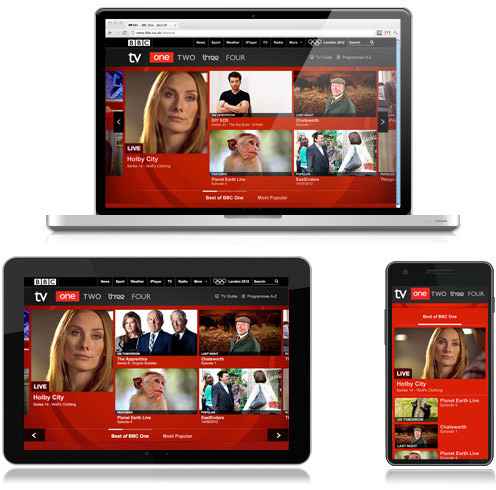
The same BBC One homepage on desktop, tablet, and mobile
Hello, my name is Dave Killeen and I am the Executive Product Manager for TV & iPlayer on PC and mobile web platforms.
Today sees the relaunch of three of the BBC's channel homepages (BBC One, BBC Two, BBC Four; BBC Three relaunched last week) and in this post, I would like to give you an overview of what we set out to achieve and how we went about doing so.
How the purpose of channels homepages has changed
When the team relaunched these channel homepages nearly four years ago, how people interacted with the web and what people expected of it was quite different. BBC iPlayer was less than a year old and accessing the web through a mobile device was also in its relative infancy; Apple's App Store was 4 months old and Google's Android platform was still in beta.
Four years on, BBC iPlayer continues to grow from strength to strength with approximately 2bn requests served to audiences last year and 1 in 4 online users in the UK accessed it last week. And mobile web usage in that time has seen equally spectacular growth with nearly 1 in 3 people who visited the BBC last week doing so on a mobile or tablet device- all 22m of them!

The old BBC homepage had two promotional slots showcasing content on BBC iPlayer
How times have changed
As you can see from the layout of the previous channel homepages above, they were built with the planning of 'offline' TV viewing being front and centre, with little real estate given to showcasing the breadth of channel content that you could consume right there and then.
Where the few opportunities did exist for our editorial colleagues in Vision to curate and promote, it was quite a manual task to do so and as you can see from the following heatmap, it was not the most efficient use of people's time.
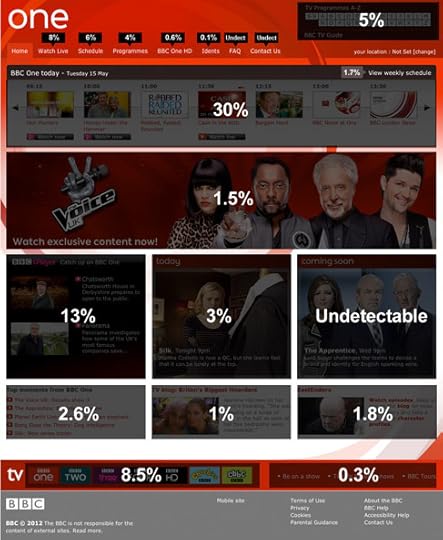
Heatmap showing the percentage of people that clicked through the various links on the page
The opportunity
This refresh opportunity, therefore, was for a much-improved channels homepage presence that would allow each channel to stand its ground uniquely and showcase the breadth of content that it produces in a way which was simply more efficient and a great deal more engaging for audiences.
And with nearly 350 different mobile devices accessing the BBC website last week, the other opportunity (and challenge!) for the team was to build this in a way which worked just right across as many of these devices as possible - each with their own unique way of displaying content depending on screen size. Gone are the days of having to build a website for one screen!
The approach - serendipitous discovery
Showcasing the breadth of content unique to that channel in a way which would deliver simple and serendipitous discovery was a key editorial goal.
The team devised a logic to blend different automated feeds of content from BBC iPlayer (most popular, most shared by audiences, popular content that is about to fall outside the catch-up window (labelled 'Don't Miss')) along with links to live programming and a sprinkling of manually-curated items (labelled 'Featured') that together would achieve this goal of a serendipitous browsing experience.
That was the easy part!
The approach - responsive design
More challenging for the team was building this product responsively so that it would work on the majority of smart mobile and tablet devices, regardless of screen size.
This project was the first here at the BBC that would be built responsively from mobile right up through to desktop. Whilst hugely exciting for the team, it also meant that we did not have other product teams in the business that we could lean on for advice and lessons that they would have learnt along the way. In fact we are still on a learning curve!
In the end, we settled on a range of breakpoints (layouts), that we felt would work for the majority of devices that access the BBC today and we developed it in a way that allows us to review (or respond!) as the mobile device market evolves with the arrival of new and promising handsets.
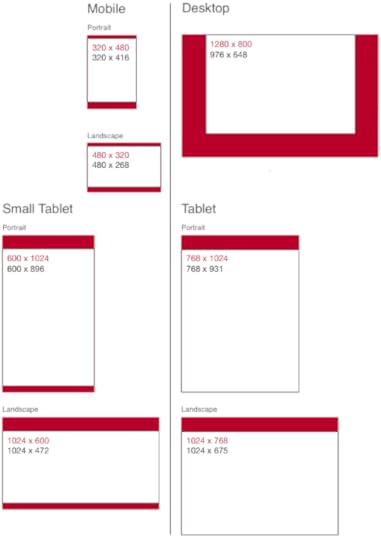
The settled upon breakpoints (for now!)
The result and our next steps
Last year, we set out three strategic goals for the TV and iPlayer product portfolio:
Beyond Catch-up
Beyond PC
Beyond Tech-Savvy
We want to position TV and iPlayer as more than just catch-up, to make it available on as many devices as possible and for it to appeal to as wide an audience as possible.
With today's refresh, we have a stronger shout to live programming, to archive collections (BBC Four) and to web exclusive content (BBC Three). Mobile and tablet devices have been taken in to consideration and the user interface across these three platforms is one that is intuitive for mainstream users.
My Vision colleague Dan Taylor, from the editorial side of the business talks through the various features made available in more detail. We hope you agree with us both that these new channels homepages are a great step in the right direction and that they do a much better job of allowing a more varied breadth of channel specific content to bubble up to audiences.
Just as we have been able to extract a heatmap of usage of the old channels homepage design, we will be keeping a close eye on the usage data that flows through in the coming months and plan on making tweaks along the way based upon this and - of course - your feedback. Do let us know what you think!
Dave Killeen is the Executive Product Manager for TV & iPlayer on PC and mobile
Reimagining the BBC's TV channels in a four screen world

BBC Three homepage across three platforms
It's 3 years 8 months since the BBC last refreshed the websites of BBC One, BBC Two, BBC Three & BBC Four and, to misquote Harold Wilson, 3 years 8 months is a long time in online.
On the 16th September 2008, there was no Apple iPad, Google Android was still in beta and BBC iPlayer had yet to celebrate its first birthday.
Today's launch reflects just how transformational the past few years have been. Rather than a static website designed for a single screen size (the PC), the new channel sites are responsively designed to work across multiple screen sizes and orientations. This chimes with the 'four screens' ambition of the BBC Online strategy and is the BBC's first attempt to design responsively across PC, tablet and mobile. Whilst there's still some polishing to do (e.g. support for swiping on touch screen devices), it feels like an important step in the right direction. Look out for a blog post from my Future Media colleague, Dave Killeen, on the technical challenges of building these pages responsively.
The new designs also reflect the increasingly mainstream nature of on demand viewing. The previous designs had space to showcase just two programmes to watch in BBC iPlayer; the new designs enable the display of up to 35, thanks to the introduction of a carousel (part of the BBC's Global Experience Language).
What's being broadcast live on the channels has also been given greater prominence and made more responsive to the time of day. Anchored in the first panel of the carousel, the live panel automatically increases in size during peak time and reducing again during off-peak hours. Online viewing of the channel simulcasts has been steadily increasing since 2008 and now accounts for 15% of BBC iPlayer TV viewing requests.
It's now easier to flip between BBC One, BBC Two, BBC Three & BBC Four, with quick links in the navigation bar, alongside a link to the full TV Guide, which showcases all BBC TV channels and those of the BBC's interlinking partners, all with 'backwards EPG' functionality, providing quick links to on demand assets where available.
The TV Guide has addressable views for the UK's various nations and regions, which can therefore be bookmarked (here's Wales) and there are more regionalisation features in the pipeline.
Despite using a single set of templates, the new designs also aim to reflect the unique personalities of each of the four channels, not just visually but in terms of their content offers. For example, the BBC Four carousel includes thematic collections of classic archive programmes (e.g. Army,All American, Talk), whilst BBC Three (which we relaunched last week) reflects activity on its social media presences and offers a 'Feed My Funny' filter of snackable comedy, made exclusively for the web.
We'll be continuing to enrich these pages over the coming months, but I'd love to hear what you think of where we've got to so far.
Dan Taylor is Executive Editor, TV & iPlayer
May 18, 2012
What's on BBC Red Button 19th - 26th May

Eurovision

Press the Red Button for an interactive Eurovision experience allowing users to sing along to the lyrics of all the songs, in both English and the original languages.
Viewers will also be invited to share their messages and photos via the BBC website, Facebook, Twitter and SMS and these comments will be broadcast throughout the show.
Available on all platforms
Freesat/Sky/Virgin Media:
Sat 26th May, 8:00pm-12:00am
Freeview:
Sat 26th May, 8:00pm-11:15pm
Chelsea Flower Show

Toby Buckland hosts the Red Button offering with tours of this year's larger show gardens, including detailed commentary from the designers on the inspiration behind their designs.
In addition, plant-a-holics Tom Hart Dyke and Christine Walkden will be sharing tales from the vast treasure trove that is the Great Pavilion, speaking to the passionate exhibitors who have been working for weeks, months and sometimes years in preparation for the week-long floral extravaganza.
Available on all platforms
Freesat/Sky/Virgin Media:
Mon 21st May, 12:00pm-6:00am
Tues 22nd May - Fri 25th May, 6:00am-6:00am
Sat 26th May, 6:00am-11:40am, 6:30pm-6:00am
Freeview:
Mon 21st May, 12:30pm-1:30pm, 7:10pm-6:00am
Tue 22nd May - Wed 23rd May, 6:00am-6:00am
Thu 24th May, 10:45am-12:45pm, 2:45pm-6:20pm, 8:40pm-6:00am
Fri 25th May, 6:00am-6:50am, 12:30pm-2:00pm, 8:40pm-6:00am
Sat 26th May, 6:00am-9:45am
Great Northern Songbook
Join BBC Radio Ulster's Lynette Fay and Ralph McLean as they celebrate 150 years of the Ulster Hall with 'The Great Northern Songbook'. Ten varied musical acts - including Brian Kennedy, Cara Dillon and General Fiasco - join the Ulster Orchestra to play a selection of the North's finest ever rock, folk and pop songs as voted for by the public and the station's specialist music presenters.
Please note, this show contains some flashing lights.
Available on Freesat/Sky/Virgin Media:
Tue 22nd May, 8:00pm-11:00pm
Andy's Wild Adventures Quiz
Join Andy and Kip as they travel on the KipMobile far and wide in search of weird and wonderful animal facts.
Along the way, they'll ask lots of fun questions which you can answer using the coloured buttons on your remote control.
Available on Sky/Freeview
Sky:
Sat 19th May - Sun 20th May, 6:00am-7:00pm
Freeview:
Mon 19th May, 6:00am-6:50am
Sun 20th May, 6:00am-9:40am
In It To Win It
Dale Winton returns with another series of In It To Win It, the game show where people compete on general knowledge for a big money jackpot.
Think you can do better? Every Saturday press the Red Button during the show to pit your wits against the studio contestants. Come the final round, will you still be In It To Win It?
Available on Sky/Freeview:
Sat 19th May, 8:00pm-8.50pm
CBBC Extra
CBBC Extra is the home of exclusives. Watch funny clips, out-takes, star interviews, pop music, backstage previews and episodes from Children's BBC.
Go on, press red... You know you want to!
Available on all platforms
Freesat/Sky/Virgin Media:
Sat 19th May, 7:00am-10:00am
Mon 21st May - Fri 25th May, 7:00am-10:00am, 3:00pm-6:00pm
Sat 26th May, 7:00am-9:30am
Freeview:
Mon 21st May, 7:00am-10:00am
Fri 25th May, 7:00am-10:00am
News Multiscreen: Video Choice
Each weekday BBC News' On Demand team rounds up the day's strongest news pictures to bring viewers a two-minute package of highlights. On weekends the tone becomes more conversational when Red Button viewers can watch a topical interview in 'Five Minutes with...' or a round-up of the week's weird and wonderful videos in Odd Box.
Video Choice: Weekdays (available around the clock)
Five Minutes With... / Odd Box: Weekends (around the clock)
Available on Sky and Virgin only
CBeebies Red Button
BBC Red Button welcomes younger viewers and grown-ups with a sense of adventure to the big, bright and fun world of CBeebies interactive!
Your children's favourite characters are at the heart of the interactive TV experience. Satellite and digital terrestrial viewers will have slightly different offerings from one another. This has enabled the Red Button team to offer the best games tailored to each system.
CBeebies Red Button is available on the CBeebies channel, and via page 5900 on other channels.
Available on Freeview and Sky only
BBC Sport Multiscreen**
Catch up on all the latest Sport via the BBC Sport multiscreen. Headlines are available around the clock with up to five additional streams available to cover the best that BBC Sport has to offer.
Please note that Red Button sport timings are subject to change at short notice.
For the latest information refer to the BBC Sport website.
Highlights
MotoGP - The French GP. Live coverage of the MotoGP race from Le Mans.
Golf - Highlights of PGA Golf.
Formula 1 - Monaco Grand Prix. Live coverage from Monaco.
**Note all Red Button times are subject to change at short notice
BBC's Blog
- BBC's profile
- 28 followers



